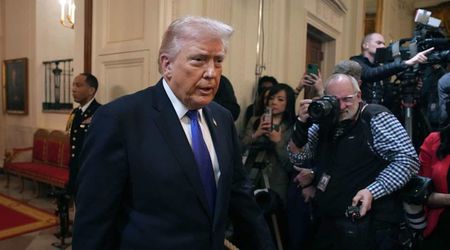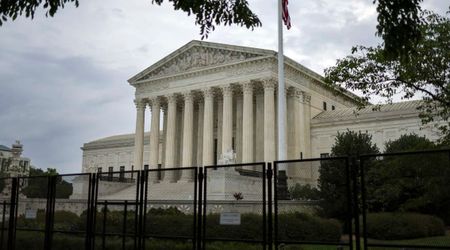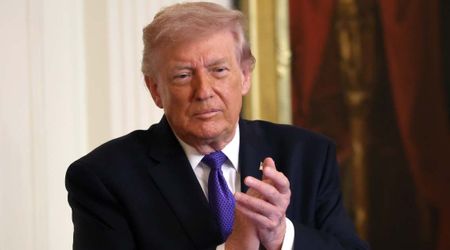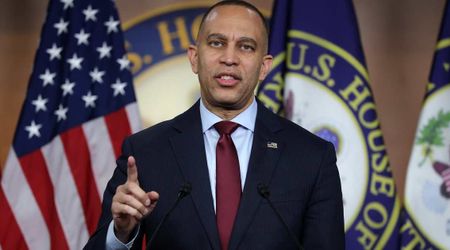What is 'DEI hire'? The meaning behind ugly Republican attacks against VP Kamala Harris

WASHINGTON, DC: The controversy surrounding diversity, equity, and inclusion (DEI) has become a pivotal issue in the 2024 presidential race.
Vice President Kamala Harris, who is on the path to becoming the Democratic nominee, has found herself at the center of this debate.
Kamala Harris branded a 'DEI hire'
Earlier this week, Tennessee Republican Representative Tim Burchett suggested in an interview with CNN’s Manu Raju that President Joe Biden selected Harris as his running mate primarily because she is a Black woman. “100% she is a DEI hire,” Burchett asserted.
Supporters of Harris have rushed to her defense, touting her qualifications and potential to become the nation’s first female president. In an interview with CNN’s Wolf Blitzer, UN Ambassador Susan Rice labeled the attacks from Republicans as “extremely offensive and dehumanizing.”
Rice argued that these criticisms imply that individuals from marginalized groups who attain success do so without merit. “That is incredibly insulting,” she added.
Harris is not the only target of Republican efforts to discredit DEI and its beneficiaries. According to The Chronicle of Higher Education, since 2023, 85 anti-DEI bills targeting college programs have been introduced in 28 states and Congress, with 14 of these bills being signed into law in states such as Texas and Florida.
A 2023 Pew Research Center survey found that 52% of employed US adults have DEI training or meetings at work, and 33% have a designated staff member promoting DEI. However, some companies have begun to reduce their DEI teams, and prominent corporate leaders like Bill Ackman and Elon Musk have publicly criticized diversity programs.
Critics argue that DEI initiatives are discriminatory and attempt to solve racial discrimination by disadvantaging other groups, particularly White Americans. In contrast, supporters and industry experts maintain that DEI has been politicized and misunderstood.
What is DEI?
CNN interviewed seven DEI experts and industry leaders to define diversity, equity, and inclusion. While their responses varied slightly, they shared a common vision:
Diversity: Embracing differences, including race, age, ethnicity, religion, gender, sexual orientation, physical ability, and other aspects of social identity.
Equity: Treating everyone fairly and offering equal opportunities.
Inclusion: Respecting everyone’s voice and fostering a culture where people from all backgrounds feel free to express their ideas and perspectives.
Daniel Oppong, founder of The Courage Collective, explained that DEI was created to address the lack of equal opportunities for marginalized communities in majority-White corporate settings. “It was an attempt to try to create workplaces where more or all people can thrive,” he said.
The roots of DEI can be traced back to the Civil Rights Movement. President Lyndon Baines Johnson signed the Civil Rights Act on July 2, 1964, making it illegal to discriminate based on race, color, religion, sex, or national origin. The Act also established the Equal Employment Opportunity Commission (EEOC), which works to eliminate employment discrimination.
DEI in workplaces
Dominique Hollins, founder of the DEI consulting firm WĒ360, highlighted that DEI programs originated during the Civil Rights Movement. Title VII of the Civil Rights Act created the EEOC, which led to companies incorporating diversity into their business strategies through diversity training.
These efforts emerged around the same time as affirmative action, initiated by President John F Kennedy. Though often confused, affirmative action differs from DEI by requiring federal contractors to treat all applicants and employees equally, regardless of race, color, religion, or sex.
Despite setbacks during President Ronald Reagan's era of corporate deregulation in the 1980s, which caused some diversity efforts to lose momentum, DEI continued to evolve.
Following George Floyd’s death at the hands of Minneapolis police in May 2020, there was a renewed push for creating DEI leadership roles and initiatives at major corporations.
Between 2019 and 2022, chief diversity and inclusion officer roles grew by 168.9%, according to a LinkedIn analysis. However, some of these efforts have since been rolled back due to a lack of support.
Despite the backlash against DEI programs and initiatives, many companies remain steadfast in their support. A survey by Ipsos published in January found that 67% of respondents said their employers offer or require DEI training, and 71% believe DEI training is essential for creating a positive workplace culture.
Criticisms of the DEI concept
DEI has become a contentious issue among lawmakers, corporate leaders, and conservative activists. Critics argue that DEI initiatives are inherently discriminatory and foster division. The Supreme Court’s decision to gut affirmative action in college admissions has emboldened some of these critics.
Christopher Rufo, a senior fellow at the Manhattan Institute and vocal DEI critic, wrote in a New York Times op-ed that “these are not neutral programs to increase demographic diversity; they are political programs that use taxpayer resources to advance a specific partisan orthodoxy.”
Similarly, Ryan P Williams, president of the conservative Claremont Institute, told CNN that DEI is “fundamentally anti-American,” describing it as a system that imposes racial preferences and perpetuates division.
“The words that the acronym ‘DEI’ represents sound nice, but it is nothing more than affirmative action and racial preferences by a different name, a system that features racial headcounts and arbitrarily assigned roles of ‘oppressor’ and ‘oppressed’ groups in America,” Williams said.
“If we continue to do democracy this way, it will only end in acrimony, strife, resentment, and American collapse.”
Billionaire investor Bill Ackman and Tesla CEO Elon Musk have also been outspoken critics. Ackman posted a 4,000-word critique on social media platform X, calling DEI an “inherently racist and illegal movement.” Musk echoed these sentiments, stating, “DEI is just another word for racism. Shame on anyone who uses it.”
DEI is just another word for racism. Shame on anyone who uses it. https://t.co/HM94ZZmfhU
— Elon Musk (@elonmusk) January 3, 2024
The future of DEI
Not all business leaders agree with the anti-DEI stance. Billionaire businessman Mark Cuban defended DEI on social media, arguing that a diverse workforce benefits businesses and their stakeholders. “The loss of DEI-Phobic companies is my gain,” Cuban wrote. “Having a workforce that is diverse and representative of your stakeholders is good for business.”
The fight over DEI is far from over. In April 2022, Florida Governor Ron DeSantis signed HB 7, known as the “Stop WOKE” bill, into law. Similar anti-DEI bills have been signed into law in Texas, North Dakota, North Carolina, Tennessee, and Utah.
In Nebraska, Republican State Senator Dave Murman proposed a bill that would prohibit state colleges and universities from using public funds for DEI efforts. Democratic State Senator Danielle Conrad opposes the bill, arguing that banning DEI is “divisive” and distracts from pressing issues like affordable tuition.
“We absolutely know from common sense and research that when we have more diverse perspectives in discussion or as part of our education, it helps us to have more thoughtful results,” Conrad said. “It helps us to be more well-rounded, active, and engaged citizens.”










